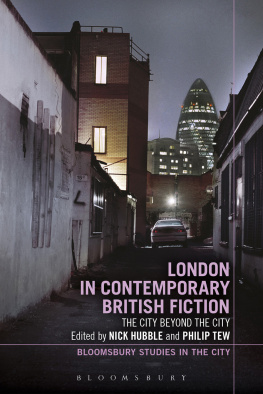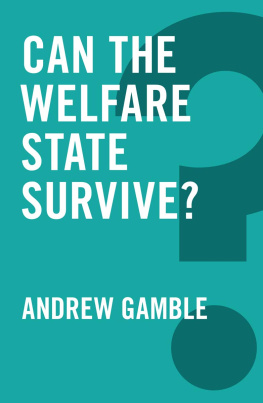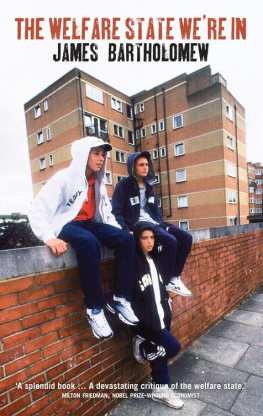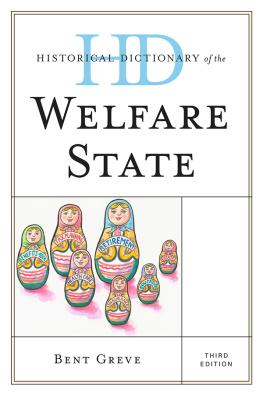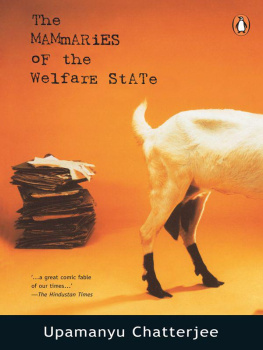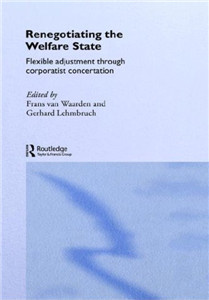Growing Old with
the Welfare State
ALSO AVAILABLE FROM BLOOMSBURY
State and Society: A Social and Political History of Britain since 1870 (5th Edition), Martin Pugh (2017)
The British Welfare Revolution, 1906-14, John Cooper (2017)
1938: Modern Britain, Michael John Law (2017)
When the Girls Come Out to Play, Katharine Milcoy (2017)
Leisure, Voluntary Action and Social Change in Britain, 1880-1939, Robert Snape (2018)
The Womens Liberation Movement and the Politics of Class in Britain, George Stevenson (2019)
Growing Old with
the Welfare State
Eight British Lives
EDITED BY
NICK HUBBLE, JENNIE TAYLOR
AND PHILIP TEW
To our respective partners
T he editors of Growing Old with the Welfare State wish to first acknowledge the financial and other support provided by the New Dynamics of Ageing (NDA) Programme involved in funding the original research on which this volume draws, the Fiction and Cultural Mediation of Ageing Project (FCMAP), overseen by the Economic and Social Research Council on behalf of this unique cross-research council initiative. Thanks too to those at the Research Support and Development Office (RSDO) at Brunel and at the think tank Demos who helped shape the initial application and additionally to Louise Bazalgette and John Holden at Demos for various insights they offered during the research process. During the course of the original research project, we were ably assisted by Natalia Clarke and subsequently Denise Odell, the FCMAP administrators. This book directly results from the follow-on project to FCMAP, New Narratives of Everyday Ageing in Contemporary Britain, funded by the Economic and Social Research Council (ESRC).
We would also like to thank all those who took part as respondents in the two strands of FCMAP, both under the aegis of Mass Observation (MO) and the London and Banstead districts of the University of the Third Age (U3A). In particular, we are deeply grateful for the participation and enthusiasm of the contributors included in this volume, without whom the book would simply not exist. We would further like to acknowledge the immense efforts in support of our research made by Jennifer Anning and Keith Richards of the U3A. With regard to MO staff, we would like to thank Dorothy Sheridan for initial discussions of the FCMAP project and help in framing the MO directive sent out late in 2009 and Jessica Scantlebury for ongoing liaison over the directive and her assistance with MO archival material alongside Fiona Courage, Rose Lock, Joe Williams and everyone else working in Special Collections formerly held at the University of Sussex Library and now across the road in the Keep, Falmer. We thank the Trustees of the Mass-Observation Archive for permission to quote MO material. We are also grateful to Gordon Wise, Richard Pike and Niall Harmon at Curtis Brown for their help in organizing the publication of this book with Bloomsbury and to Beatriz Lopez, Dan Hutchins and their colleagues at Bloomsbury.
Also worthy of mention is Dr Jago Morrison of Brunel University who as a participating member of the FCMAP research team helped both develop and shape the original project, after which he continued to offer suggestions throughout the process. Responding to his interventions helped refine our methodological and analytical approaches.
G rowing Old with the Welfare State presents extracts from the stories of eight British people born between 1921 and 1943, who record and celebrate on a personal level various radical and important shifts in both their own lives and British cultural life over the last century. As described below and in more detail in the appendix to this book, these stories come from a research project called Fiction and the Cultural Mediation of Ageing (FCMAP) that was carried out by the Brunel Centre for Contemporary Writing (BCCW) at Brunel University London as part of the UK-wide New Dynamics of Ageing (NDA) research programme, coordinated by Professor Alan Walker (Sheffield University) for the Economic and Social Research Council (ESRC). This Brunel research project was carried out in collaboration with the Mass Observation (MO) Project and University of the Third Age (U3A) groups from the London and Banstead districts. Six of our writers are from MO and two of them are from the U3A.
In the 1960s, youth became a cultural fixation and permeated a whole plethora of fields and activities, displacing the traditional and the staid from view. However, as the baby boomers aged and the demographic balance has shifted dramatically, ageing itself is perhaps at last becoming trendy. One only has to consider the popularity of Diana Athill or Penelope Livelys celebration of old age in the Guardian on the occasion of her eightieth birthday in 2013 to see how the zeitgeist has shifted so rapidly over the past decade. People now admire and, even, envy those in the retired age ranges for their continued enthusiasm, their varied lifestyles and their apparent, outward financial security. Our intention for Growing Old with the Welfare State was to contribute to this ongoing cultural phenomenon by bringing together a selection of ordinary people reflecting on their lives over a period of sixty plus years by discussing how they live now and how they got to this point in time the past the prologue to the present.
This intention is still reflected in the book in front of you, but it has become subtly altered following the completion of the original FCMAP and further time to reflect properly on its results and conclusions. As noted in the book that two of us wrote following that project, Ageing, Narrative and Identity, our public and social concept of successful ageing has to be revised (Hubble and Tew 2013: 199). This is because such notions as successful or active ageing suggest a subtle orthodoxy that there is such a thing as unsuccessful or inactive ageing. The implicit message is that those unable, perhaps for reasons of health or lack of resources, to participate in the celebratory ageing zeitgeist of good health and outward orientation are somehow to blame for their own lack of success over the life course. In particular, we argued that the conventional understanding of the third and fourth ages as respectively a post-retirement age of personal fulfilment and a final era of dependence, decrepitude and death (Laslett 1996: 4) needed to be rethought. While there has undoubtedly been a major social revolution by which third-agers in their sixties, seventies and eighties are now living completely different lifestyles to those of the mid-twentieth century, the challenge of this paradigmatic change for society as a whole is not just to stop considering people in these age ranges as old but
to ensure that the consequent expansion of third age identification is not based on subjects defining themselves against a fourth age of decline and death. As we have shown, there is now the possibility of positively defining a new understanding of the fourth age in which it is possible to accept that one has become old and perhaps infirm, but still partaking of and contributing to life and society. Such a successful fourth age is a product of reflective narrative. (Hubble and Tew 2013: 200)
By reflective narrative, we mean the kind of life writing promoted by MO and made familiar to the general reading public through the publication of individual diaries such as Nella Lasts War (1981) memorably dramatized for television as Housewife, 49 (2006) by the late Victoria Wood who also won a BAFTA for her performance in the main role or the three collections edited by Simon Garfield:



